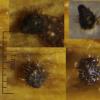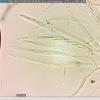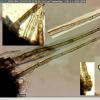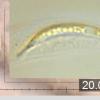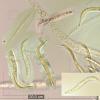
05-02-2026 06:43
Stefan BlaserHello everybody, Any help on this one would be mu

03-02-2026 20:44
Zetti MarioWhen I first saw this white mould on an Agaricus s

18-08-2025 15:07
 Lothar Krieglsteiner
Lothar Krieglsteiner
.. 20.7.25, in subarctic habital. The liverwort i

02-02-2026 21:46
Margot en Geert VullingsOn a barkless poplar branch, we found hairy discs

02-02-2026 14:55
 Andgelo Mombert
Andgelo Mombert
Bonjour,Sur thalle de Lobaria pulmonaria.Conidiome

02-02-2026 14:33
 Andgelo Mombert
Andgelo Mombert
Bonjour,Sur le thalle de Peltigera praetextata, ne

31-01-2026 10:22
 Michel Hairaud
Michel Hairaud
Bonjour, Cette hypocreale parasite en nombre les

02-02-2026 09:29
 Bernard CLESSE
Bernard CLESSE
Bonjour à toutes et tous,Pour cette récolte de 2

01-02-2026 19:29
 Nicolas Suberbielle
Nicolas Suberbielle
Bonjour, Marie-Rose D'Angelo (Société Mycologiq
This asco has grown in moist chamber on debris from perennials, collected 29.05.2015 in Stange, Norway.
Perithecia about 420 x 300 µm,
Spores 42 x 3 µm, strait when young. I could not see any septation, but I think they are not fully grown?
Asci 125x 9 µm,
Hairs up to 261 x 7.7 µm, hair wall up to 2.4 µm thick.
I think it is a Lasiosphaeria or Hilberina. After studying the information I found available on the web the closest I can find is L. breviseta, but the substrate does not fit?
Thank you for any help
Regards Per Vetlesen

the ascospores are likely those of H. breviseta and as you say, the septation is often delayed. The growth in moist chamber may have affected some other morphological traits like the length of the setae. This is a fairly rare species, at least in my region.
Jacques
Did you note the recent paper by Andrew Miller cs that he has made available on this forum: http://www.ascofrance.fr/search_forum/29631 ? It includes a key to all Lasiosphaeria s.l. and L. breviseta is now included in the (newly created) genus Hilberina. Reference is also made to another species which is similar and may be conspecific: Hilberina rhynchospora.
I have found Hilberina breviseta in the Netherlands too. I will add some more details later because this does seem to be a rare or at least unknown species.
The spore form is quite striking!
Eduard
Thanks for the quick reply:-)
L. breviseta is a rare species and that is why I doubted it could be right.
No, I have not seen the paper by Andrew Miller cs, but after reading it I still think it must be L. breviseta despite it is growing on a different substrate. Andrew Miller did not observe any septation on the spores.
The material consist of just a few fruit bodies, some are still in the moist chamber in hope of mature spores. In about a week I will have a new look at in the moist chamber in hope of mature spores.
Per

